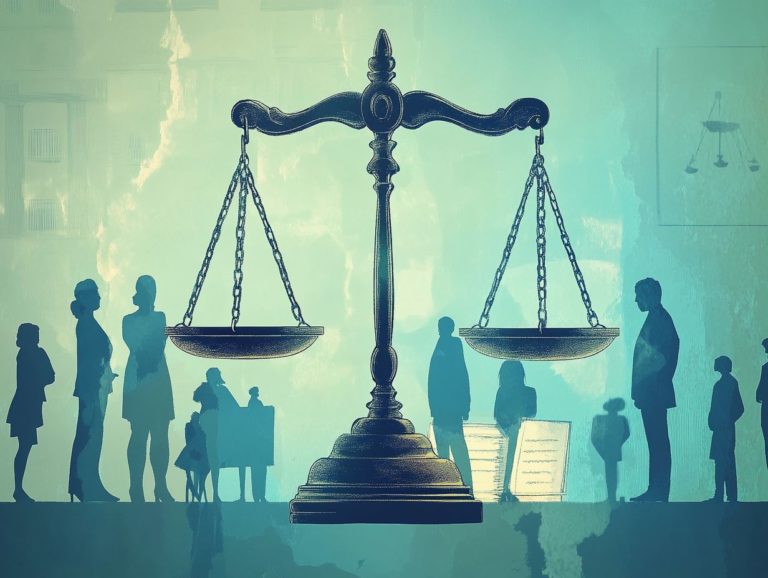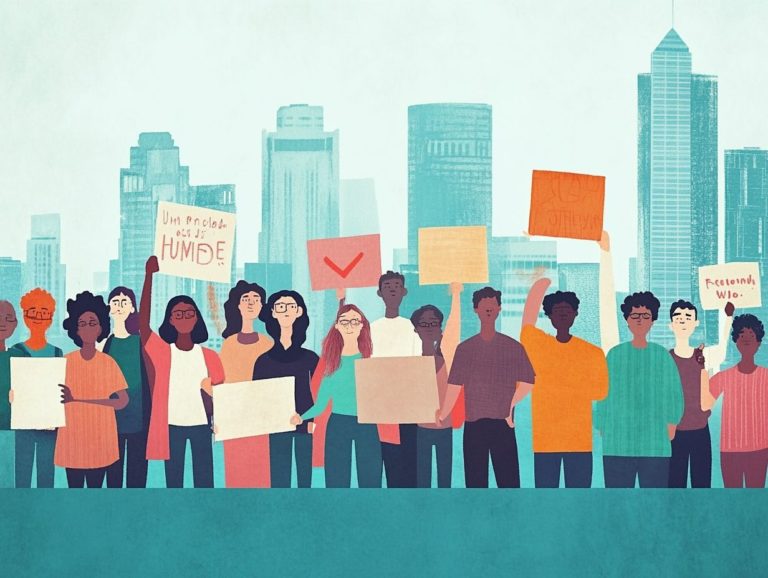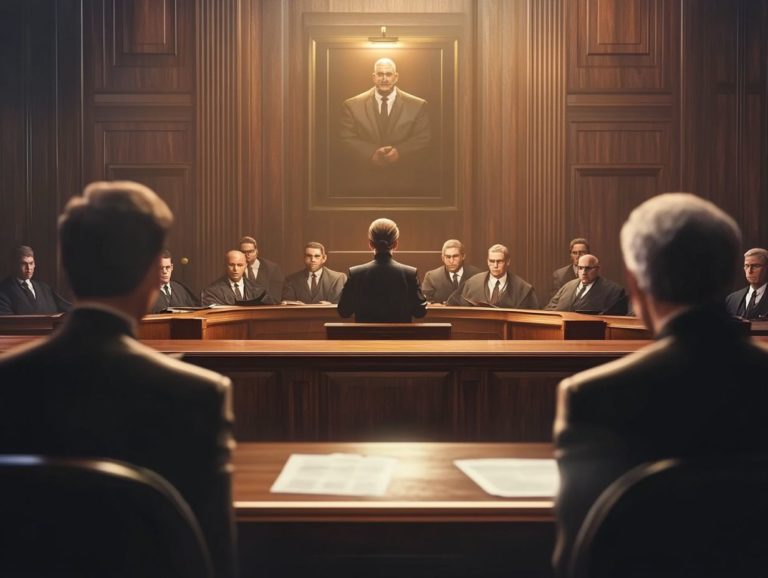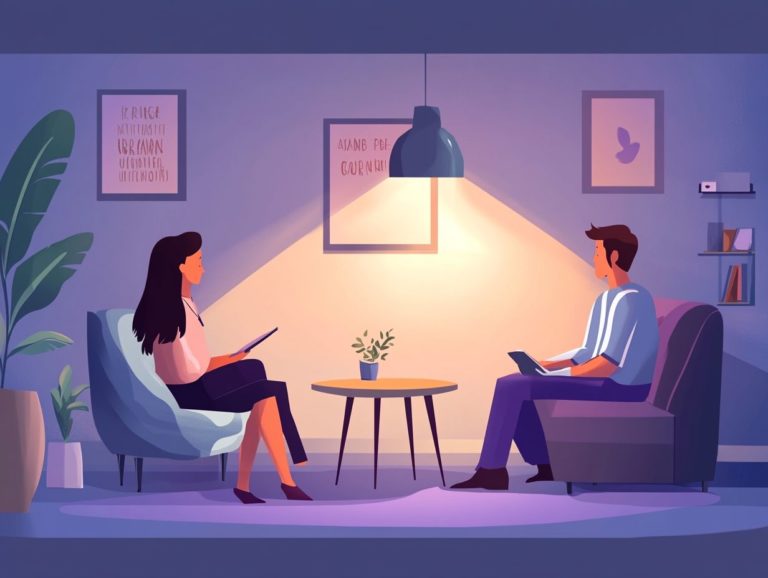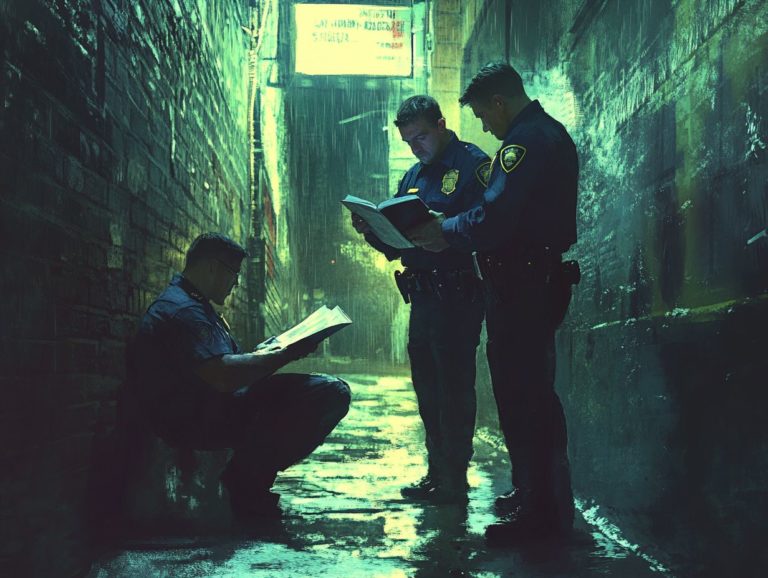How to Protect Your Rights During a Traffic Stop
Traffic stops can be stressful and confusing. You may feel uncertain about your rights and responsibilities behind the wheel.
Understanding what to expect during these encounters is essential for protecting your rights and ensuring a smooth interaction with law enforcement. This article offers vital information, guiding you from preparing in advance with the necessary documents to confidently asserting your rights during the stop.
It also addresses actions to take if your rights are violated and how to safeguard yourself in the courtroom. Stay informed! Know your rights and navigate the roads with confidence!
Contents
Key Takeaways:
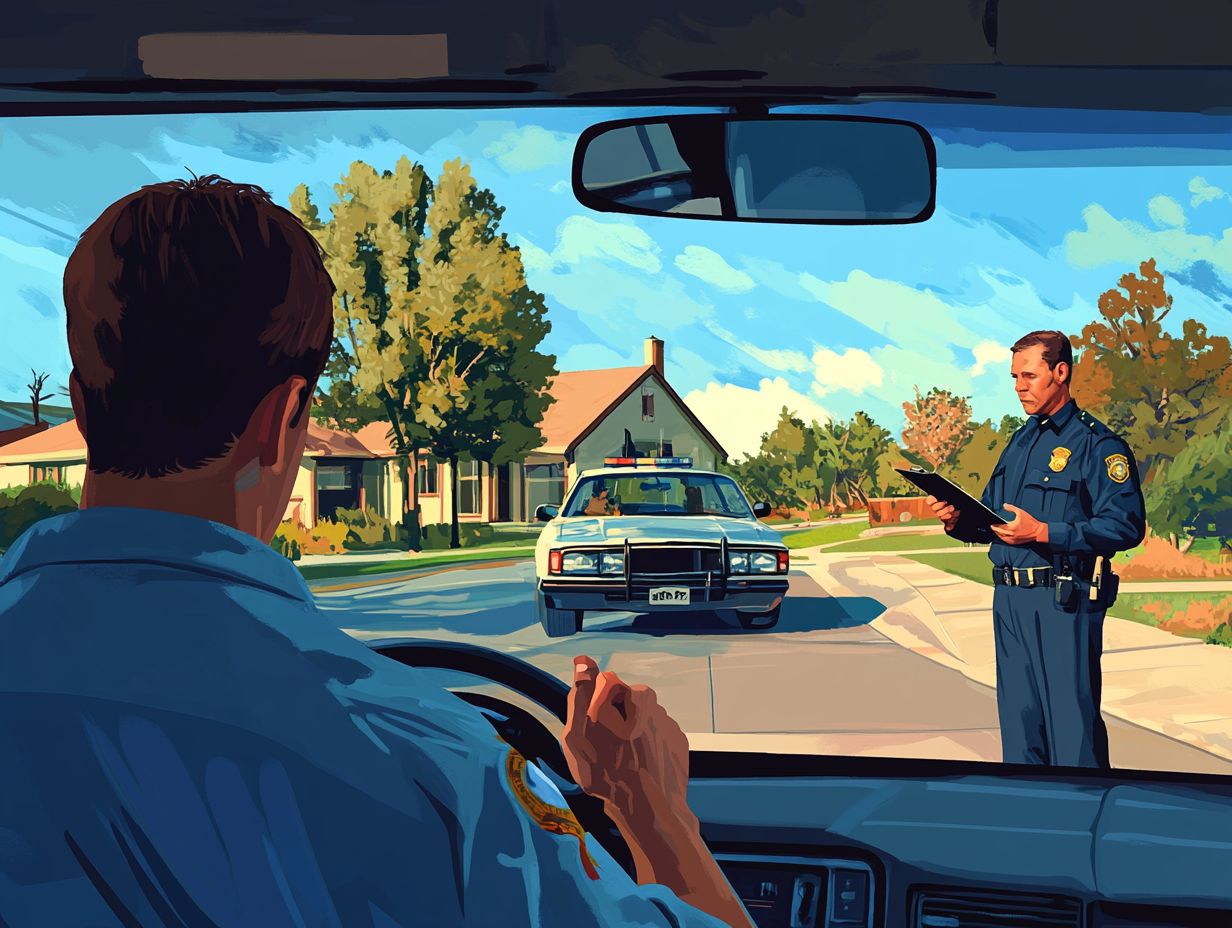
- Know and understand your rights during a traffic stop to protect yourself and ensure a fair interaction with law enforcement.
- Be prepared for a traffic stop by having important documents on hand and mentally preparing yourself for the situation.
- If your rights are violated during a traffic stop, assert them, record the interaction, and report the incident. Seek legal representation and present evidence of the rights violation in court.
Understanding Your Rights During a Traffic Stop
Knowing your rights when stopped by police during a traffic stop is essential for keeping yourself safe from potential police overreach or unlawful searches.
While a traffic stop can feel intimidating, understanding your rights during arrest can minimize misunderstandings and complications during your encounter with law enforcement. This knowledge enables you to assert your legal rights confidently.
Whether you re a local resident or just passing through, being well-informed about what to expect during a traffic stop can truly change the game.
What are Your Rights?
During a traffic stop, you have specific rights protected by law. You have the right to know if you’re being detained and the right to refuse consent for a search without a warrant.
Understanding these rights is essential for your protection. Remember, you have the right to remain silent and can choose not to answer any questions that might incriminate you.
You also have the authority to question law enforcement officers if it seems there s no probable cause for the stop. If you refuse consent for a search, officers generally need a warrant to proceed legally.
By asserting your rights and maintaining a calm demeanor while respectfully communicating, you can significantly influence the interaction and ensure that your rights are upheld.
Preparation for a Traffic Stop
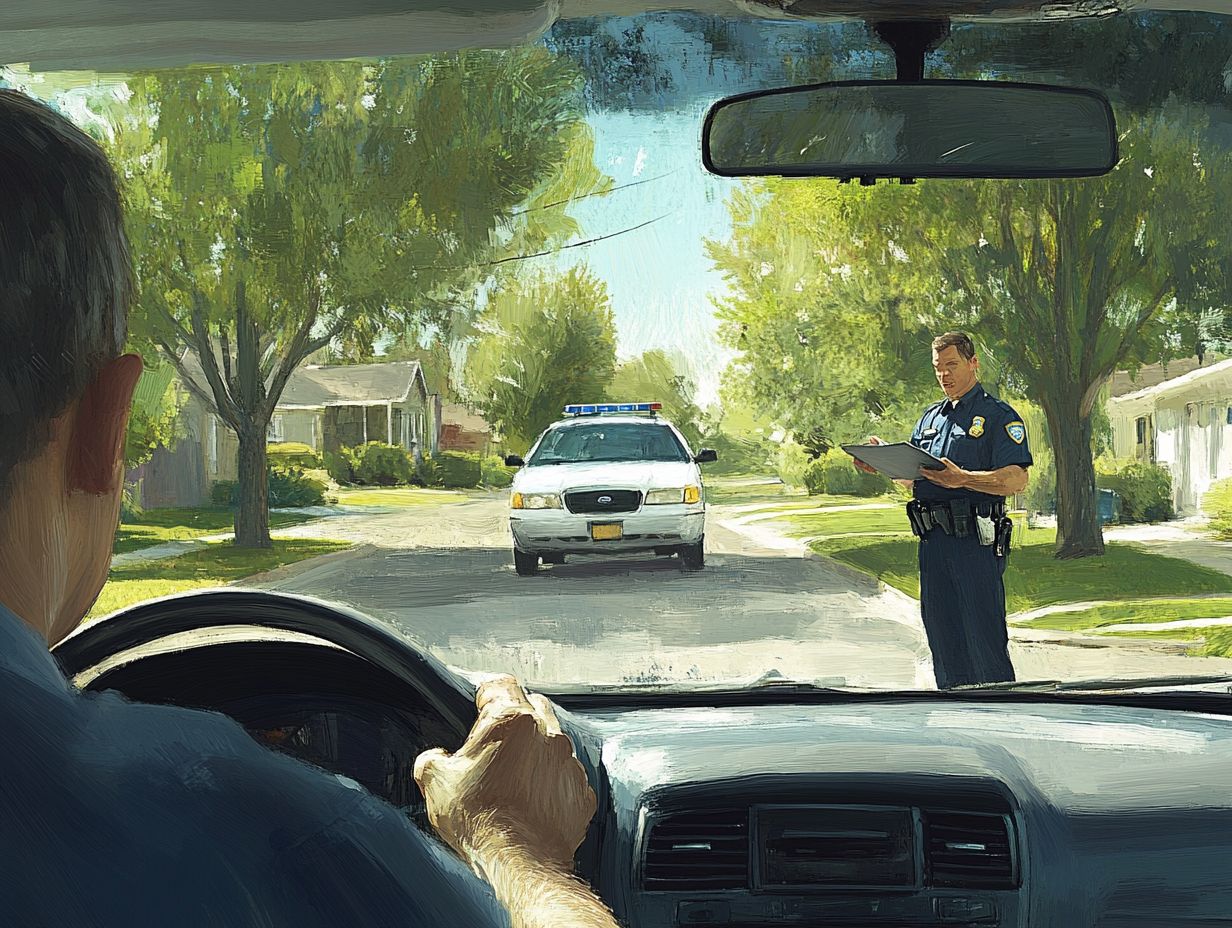
Preparation is essential when navigating a potential traffic stop. Having the necessary documents ready can significantly enhance your experience.
This approach ensures compliance with traffic laws and protects your rights during the interaction.
Important Documents to Have on Hand
Having the right documents at your fingertips during a traffic stop can streamline the experience and ensure you meet police requests.
This means having key items ready, like your driver s license, which confirms your identity and driving privileges, and your vehicle registration, which establishes ownership of the car.
Keeping your insurance information handy shows that you re properly insured and builds trust with law enforcement.
Additionally, having the contact details for any legal representation can provide an extra layer of assurance during the encounter.
By staying organized and prepared with these essential documents, you can navigate the stop more smoothly, reinforcing your legal standing while promoting a respectful conversation.
Mental Preparation
Mental preparation before a traffic stop is just as vital as having all the necessary documents. It helps you handle encounters with law enforcement with clarity and confidence while safeguarding your rights.
Practice calm responses to stay composed during unexpected interactions. Understanding your legal rights allows you to stand up for yourself without escalating the situation.
Picture scenarios like receiving a speeding ticket or being asked to exit your vehicle. Mentally rehearsing appropriate responses can be incredibly beneficial.
Having a solid emergency plan, including contacts for legal representation, brings peace of mind. By anticipating potential outcomes and preparing for them, you can navigate these encounters with a newfound sense of control, leading to more positive interactions overall.
During the Traffic Stop
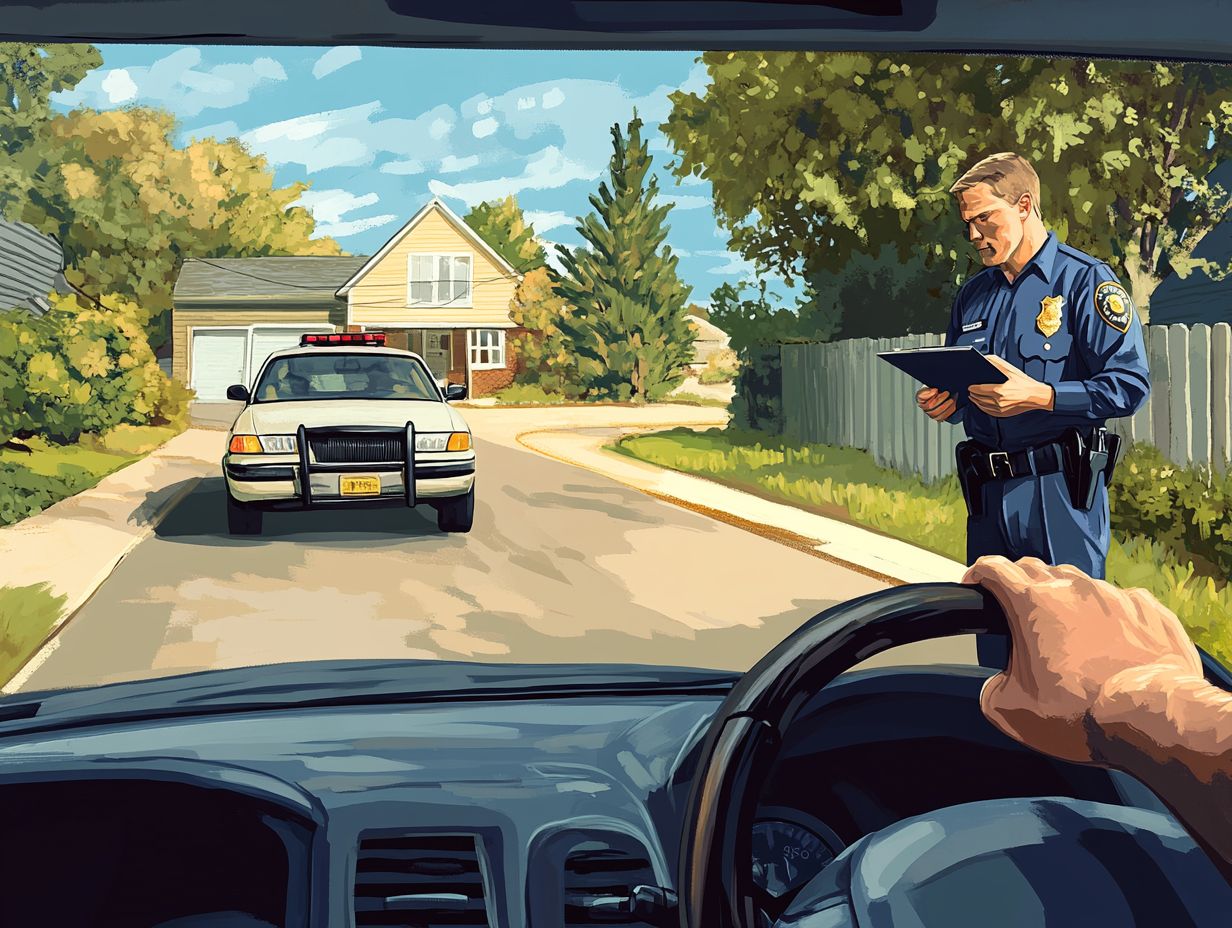
During a traffic stop, the way you engage with law enforcement can greatly affect the outcome.
It s crucial to be aware of appropriate procedures and maintain a safe distance while complying with police requests.
Understanding this helps you navigate the situation more effectively and minimize potential complications.
Interacting with Law Enforcement
When interacting with law enforcement during a traffic stop, maintaining respect and composure is essential. This approach paves the way for a smoother exchange and helps safeguard your rights throughout the encounter.
Calmly introduce yourself to set a tone of respect from the start. Politely request the officer’s badge and identification to promote transparency.
Being aware of your police rights like your right to remain silent and your right to refuse searches without a good reason can significantly shape the outcome. Non-compliance might escalate tensions or lead to legal issues.
Thus, approaching the situation with a clear understanding of your rights and a composed demeanor benefits you and fosters respectful dialogue with law enforcement.
Asserting Your Rights
Asserting your rights during a traffic stop is crucial as it enables you to maintain control of the situation and ensures that your rights in traffic violations are respected by police procedures.
When faced with a traffic stop, remember that you can calmly and respectfully inform the officer of your right to remain silent. For instance, saying, “I m choosing to remain silent at this time” sets a respectful tone from the start.
If the officer asks to search your vehicle, confidently respond, “I do not give consent to search my vehicle.” This direct language communicates your stance clearly.
If you encounter resistance, remaining composed is essential. You might say, “I understand you have a job to do, but I must respectfully decline without a warrant or good reason.” This asserts your rights while avoiding escalation.
What to Do if Your Rights are Violated
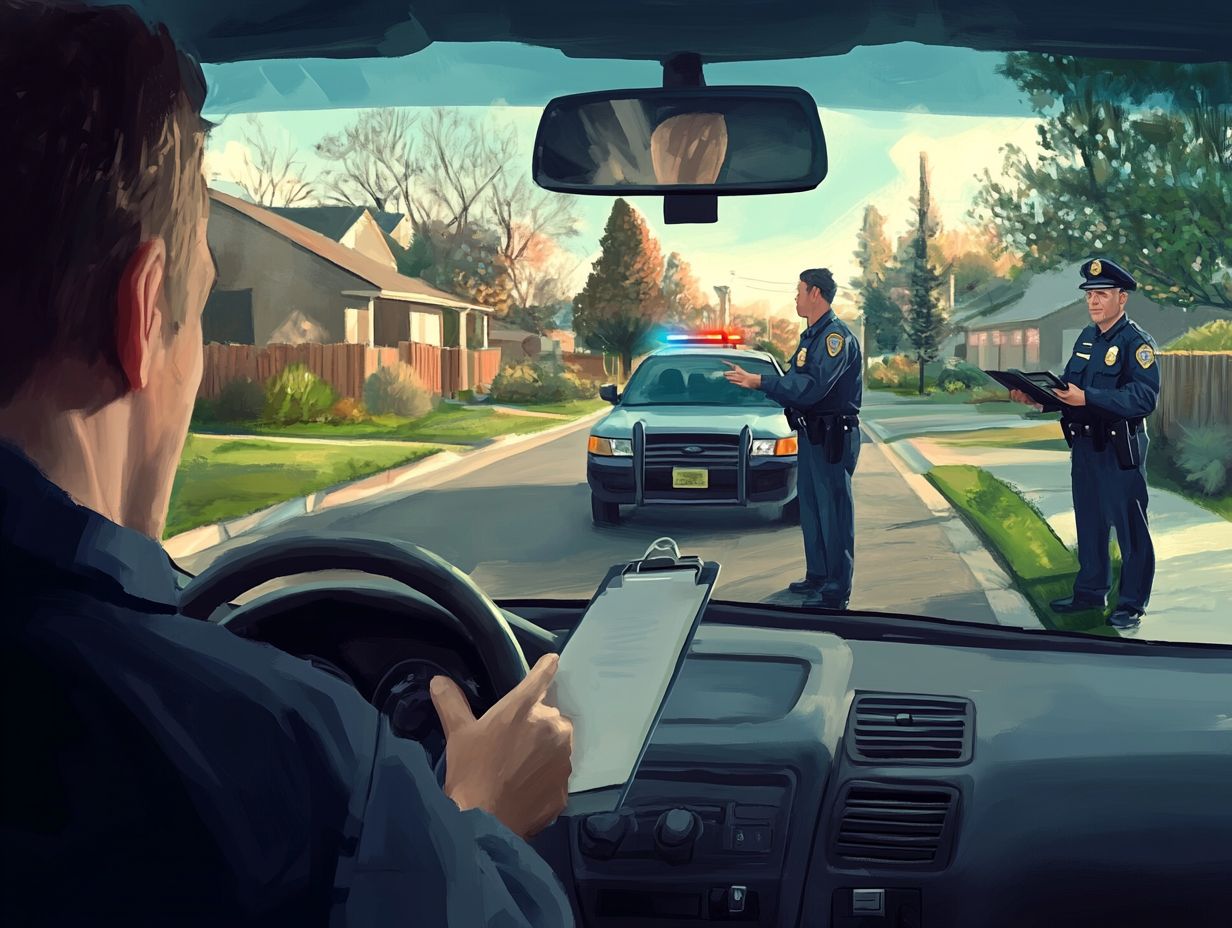
If you suspect your rights have been violated during a traffic stop, act quickly every second counts!
Begin by documenting every detail of the incident, as this information will be invaluable.
Then, report your experience to the appropriate authorities to pursue justice and hold those responsible accountable. Your proactive approach can make a significant difference.
Recording the Interaction
Recording your interaction with law enforcement during a traffic stop can be a powerful way to document the event and provide crucial evidence if your rights are compromised. It s vital to understand the legalities surrounding this practice, as recording laws differ from state to state.
Discreetly capturing the interaction is advisable to avoid escalating tensions; overt actions might provoke unnecessary responses. Ensure your recording is stored securely backing it up to a cloud service or external drive is essential for preserving evidence for any potential legal proceedings.
Video evidence has proven invaluable in holding police accountable, often shaping public perception and prompting critical reforms. This reinforces the significance of transparency in law enforcement.
Stay informed about your rights to ensure you re always prepared!
Reporting the Incident
Reporting a police encounter that violated your rights is essential for encouraging responsibility and helping to prevent future abuses by law enforcement.
This process starts with drafting a clear and concise written complaint to the appropriate internal affairs department, the office that investigates police misconduct, or police agency.
As you compose your complaint, it’s vital to include specific details such as the date, time, and location of the incident, along with the names of any involved officers, if you have that information.
Incorporating evidence like photographs or witness statements can significantly bolster your case.
If you feel overwhelmed, don t hesitate to seek help. Seeking legal representation could be advantageous to help you understand the legal process.
Reporting such incidents can lead to corrective actions, policy changes, or disciplinary measures against officers, ultimately contributing to a more equitable system.
Protecting Your Rights in the Courtroom
Protecting your rights in the courtroom after a traffic stop is crucial, particularly if you suspect that those rights have been violated.
Engaging effective legal representation can profoundly impact the outcome of your case, ensuring that your interests are safeguarded and your voice is heard.
Legal Representation
Having legal representation is essential when you re challenging any violations of your rights in the courtroom. An experienced attorney can provide essential support and advocacy on your behalf.
Navigating the complexities of the legal system can feel overwhelming, especially after an encounter with law enforcement that raises questions about your rights. To find the right attorney specializing in civil rights or criminal defense, you can start by browsing online directories, legal associations, or community resources, which often provide reviews and ratings of local professionals.
Seeking referrals from friends or family who may have faced similar situations can also lead you to promising candidates. Once you ve compiled a list, reach out via phone or email to inquire about their experience with cases like yours.
An attorney’s role is crucial; they not only represent your interests but also educate you on your rights, prepare you for court, and work diligently to ensure that justice is served.
Presenting Evidence of Rights Violations
Presenting evidence of rights violations effectively in the courtroom is vital for building a strong case against police abuse and ensuring that your legal rights are respected throughout the proceedings.
There are various types of evidence you can gather to strengthen these claims and significantly influence the outcome of your case.
- Video recordings act as powerful visual documentation, providing an objective account of the incident.
- Comprehensive documentation, such as medical reports and official complaints, can offer tangible proof of the violation.
- Witness statements are equally important; the accounts of bystanders or individuals who were present during the event can validate and reinforce your claims.
Hiring a skilled lawyer is crucial. Experienced attorneys understand how to compile this evidence effectively, ensuring it is presented compellingly in court to support your narrative and seek the justice you deserve.
Frequently Asked Questions
What are my rights during a traffic stop?
You have the right to remain silent and not answer any questions. You also have the right to refuse a search of your vehicle without a warrant.
Can I record the traffic stop?
In most states, you have the right to record the traffic stop as long as you are not interfering with the police officer’s duties. However, it is always best to check your state’s laws beforehand.
What should I do if I feel my rights are being violated during a traffic stop?
Remain calm and respectful, and do not resist the officer. Take note of the officer’s badge number and name if possible, and file a complaint with the appropriate authorities after the stop.
Do I have to show my driver’s license and registration during a traffic stop?
Yes, you are required to show your driver’s license, registration, and proof of insurance during a traffic stop.
Can the police officer search my vehicle without my consent?
No, the officer will need probable cause or a warrant to search your vehicle. You have the right to refuse a search without a warrant.
What should I do if I am arrested during a traffic stop?
You have the right to remain silent and not answer any questions without a lawyer present. Remain calm and do not resist arrest. Contact a lawyer immediately to protect your rights.
Consider reaching out for legal assistance if you feel your rights have been compromised. Taking action is essential to ensure accountability and protect yourself.

